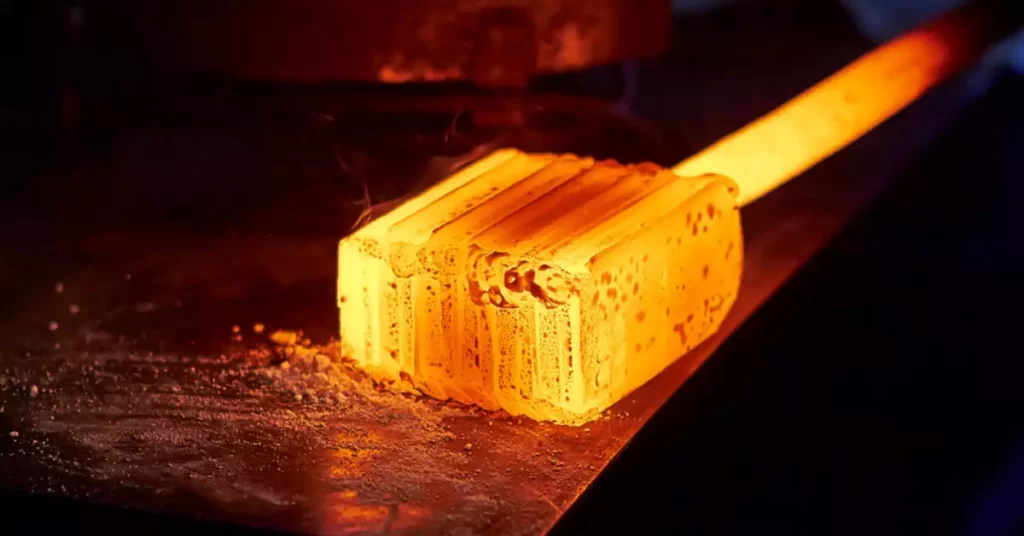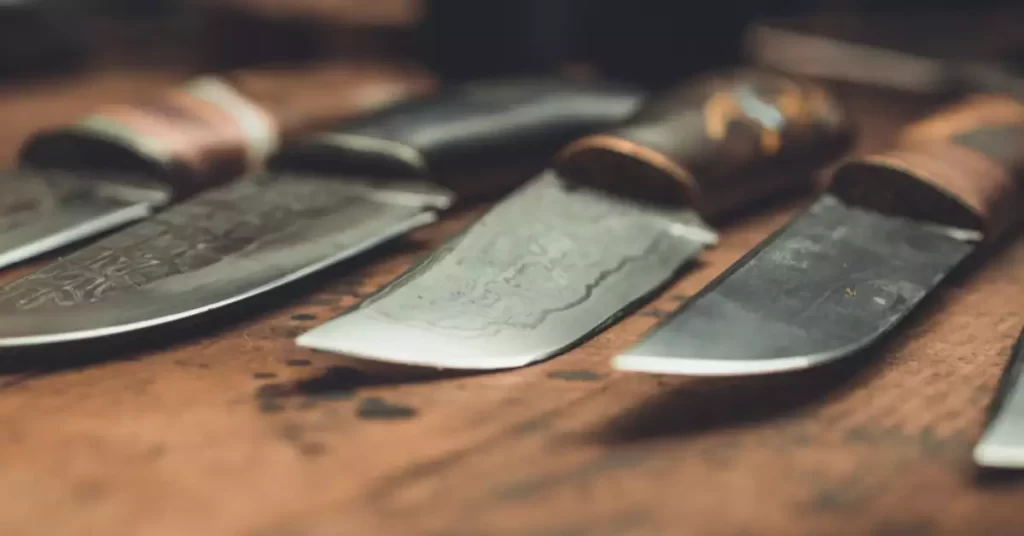Damascus steel has long been admired for its striking appearance and exceptional sharpness. This unique material, known for its distinctive patterns, is a favorite among knife enthusiasts and collectors.
However, like any other steel, it can rust if not properly maintained. In this comprehensive guide, we will explore how to clean rust off Damascus steel and keep it looking pristine for years to come.
Understanding Damascus Steel
History and Composition
The origins of Damascus steel date back to ancient times, and its name is derived from the city of Damascus, where the steel was primarily used to forge weapons.
Damascus steel is characterized by distinctive patterns that resemble flowing water, resulting from layers of different types of steel forged together.
The forging process creates a strong, yet flexible material, making it a sought-after choice for knives and other edged tools.
Importance of Proper Maintenance
Proper maintenance of your Damascus steel is crucial to preserving its beauty and functionality. Neglecting care can lead to rust formation, which can cause pitting and compromise the structural integrity of the steel.
Proper cleaning, storage, and routine maintenance will ensure that your Damascus steel remains pristine and usable for a lifetime.
Does Damascus Steel Rust?
Yes, Damascus steel can rust. Although it is made from layers of various high-carbon and low-carbon steels, the presence of iron makes it susceptible to rust.
However, with proper care and maintenance, you can minimize the risk of rust forming on your Damascus steel items.

Causes of Rust on Damascus Steel
Rust forms when iron in steel reacts with oxygen and moisture in the air. Damascus steel, being a combination of various steel types, may contain different levels of iron and carbon, making it more prone to rust.
Factors such as humidity, contact with water, and corrosive substances can accelerate rust formation on the blade.
Methods for Removing Rust
There are two primary methods for removing rust from Damascus steel: mechanical and chemical removal. Both techniques have their benefits and drawbacks, so choose the one that best suits your situation and comfort level.
Mechanical Removal
Mechanical removal involves physically scrubbing or sanding the rust off the steel. This method is ideal for removing surface rust and may require more elbow grease, but it allows you to control the process and avoid potential damage to the steel’s finish.
Chemical Removal
Chemical removal involves using substances that react with the rust, dissolving it and making it easier to remove.
This method can be effective for stubborn rust, but it’s essential to use caution, as some chemicals can damage the steel’s finish or cause discoloration.
Mechanical Removal Techniques
Fine Sandpaper
Use fine-grit sandpaper (800 to 1000 grit) to gently rub the rusted areas in a circular motion. Be cautious not to apply too much pressure, as it can damage the steel’s finish.
Steel Wool
Using 0000-grade steel wool, gently scrub the rusted areas in the direction of the grain. Avoid pressing too hard, as it may cause scratches on the steel.
Brass Brush
A brass brush is a gentle alternative to steel wool, as it is less abrasive. Use it to scrub the rusted areas, moving in the direction of the grain.
Chemical Removal Techniques
White Vinegar
White vinegar is a mild, natural acid that can dissolve rust. Soak a cloth in white vinegar and apply it to the rusted area for 30-60 minutes. Afterward, gently scrub the area with a soft brush or cloth to remove the rust.
Lemon Juice and Baking Soda
Lemon juice, another mild acid, can be mixed with baking soda to create a paste for rust removal. Apply the paste to the rusted area and let it sit for 15-30 minutes. Then, gently scrub the area with a soft brush or cloth to remove the rust.
Commercial Rust Removers
There are various commercial rust removers available on the market, designed specifically for removing rust from metals.
Always follow the manufacturer’s instructions when using these products, and be cautious to avoid damaging the steel’s finish.

WD-40 on Damascus Steel
WD-40 is a popular multi-purpose product that can help protect and clean metal surfaces, including Damascus steel.
The thin layer of WD-40 forms a barrier, keeping moisture and oxygen away from the metal.
While WD-40 can be used to clean and protect Damascus steel, it is not a long-term rust prevention solution, and other methods should be considered for long-term care.
Preventing Rust Formation
Proper Storage
Store your Damascus steel in a dry, cool place away from moisture and humidity. Use a protective sheath or case to keep the steel from coming into contact with other objects that could cause scratches or rust.
Regular Cleaning and Oiling
Regularly clean your Damascus steel with a soft cloth, removing any dirt, dust, or moisture. Apply a thin layer of oil, such as mineral oil or a specialized knife oil, to create a protective barrier against moisture and air.
Caring for the Damascus Steel Finish
Preserving the unique finish of your Damascus steel requires careful handling and maintenance. Avoid using abrasive materials or harsh chemicals that could damage the intricate patterns.
After cleaning and removing rust, consider applying a protective wax or polish designed specifically for Damascus steel to maintain its shine and beauty.
How to Keep Damascus Steel from Rusting
Here are some practical steps to prevent rust formation on Damascus steel:
- Keep your Damascus steel items clean and dry.
- Apply a thin layer of protective oil regularly.
- Store your items in a low-humidity environment.
- Use a desiccant to absorb moisture if necessary.
How to Polish Damascus Steel
Polishing your Damascus steel items can help maintain their appearance and enhance the visibility of the unique patterns. To polish Damascus steel:
- Clean the surface with a mild soap and water solution.
- Dry the item thoroughly with a soft cloth.
- Apply a non-abrasive metal polish using a soft cloth.
- Buff the surface with a clean cloth to remove excess polish and reveal the shine.
What Oil to Use on Damascus Steel
When it comes to choosing the right oil for Damascus steel, you should opt for a high-quality mineral oil, gun oil, or a dedicated knife oil.
These oils are designed to protect metal surfaces from rust and corrosion without leaving a residue or altering the appearance of the steel.
How to Clean Damascus Steel Ring
Cleaning a Damascus steel ring requires gentle care to avoid damaging the intricate patterns. Follow these steps to clean your ring:
- Mix a few drops of mild dish soap with warm water in a small bowl.
- Soak the ring in the soapy water for a few minutes.
- Use a soft-bristle toothbrush to gently scrub the ring, paying close attention to any crevices or engraved areas.
- Rinse the ring thoroughly under warm running water.
- Dry the ring completely with a soft, lint-free cloth.
- Apply a thin layer of protective oil to prevent rust.
How to Clean Damascus Steel Knife
To clean a Damascus steel knife, follow these steps:
- Wipe the blade gently with a damp cloth to remove any debris or residue.
- Dry the blade thoroughly using a soft cloth.
- Apply a thin layer of oil to the blade, ensuring full coverage of the surface.
- Wipe off any excess oil with a clean cloth.
- Store the knife in a dry place, away from moisture and humidity.
Frequently Asked Questions (FAQs)
Q: Can I use WD-40 on Damascus steel?
A: Yes, you can use WD-40 on Damascus steel to clean and protect it from rust. However, it is not a long-term rust prevention solution, and other methods should be considered for long-term care.
Q: How often should I oil my Damascus steel?
A: The frequency of oiling depends on the climate and how often you use your Damascus steel. Generally, it’s recommended to oil your steel at least once a month, or more frequently if you live in a humid area or use your blade often.
Q: Can I use a rust converter on Damascus steel?
A: Rust converters are generally not recommended for Damascus steel, as they can change the steel’s appearance and potentially harm the intricate patterns.
Final Verdict
Caring for Damascus steel items, whether they are knives, rings, or other decorative pieces, is essential to maintaining their beauty and functionality.
By following the steps outlined in this comprehensive guide, you can effectively clean rust off Damascus steel and prevent future rust formation.
Remember to use the right oil, clean your items regularly, and store them in a suitable environment to keep your Damascus steel looking its best for years to come.
